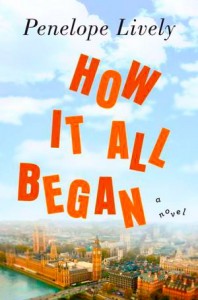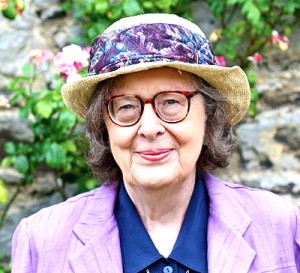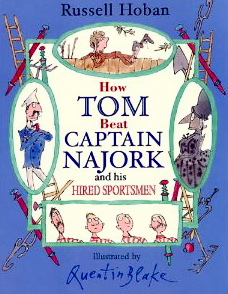Note: Penelope Lively has been shortlisted for the Booker Prize three times and is WINNER of it once, in 1987, for Moon Tiger.
“Ah, old age. The twilight years – that delicate phrase. Twilight my foot – roaring dawn of a new life, more like, the one you didn’t know about. We all avert our eyes, and then – wham! You’re in there too, wondering how the hell this can have happened, and maybe it is an early circle of hell and here come the gleeful devils with their pitchforks, stabbing and prodding.”
 Now an eighty-four year-old Dame Commander of the British Empire for her services to literature, Penelope Lively is nothing short of an inspiration. Always firmly rooted in the real world, her recent novels and main characters have followed her own path into old age. Her (mostly) good-humored acceptance of its inevitable indignities and the insightful and sometimes ironic commentary made by her elderly characters, keep the reader aware that old age, however challenging, is not necessarily a catastrophe to characters who possess grit, determination, and a sense of independence.
Now an eighty-four year-old Dame Commander of the British Empire for her services to literature, Penelope Lively is nothing short of an inspiration. Always firmly rooted in the real world, her recent novels and main characters have followed her own path into old age. Her (mostly) good-humored acceptance of its inevitable indignities and the insightful and sometimes ironic commentary made by her elderly characters, keep the reader aware that old age, however challenging, is not necessarily a catastrophe to characters who possess grit, determination, and a sense of independence.
Many readers will find How It All Began the best novel Lively has written so far, primarily because the characters and their issues sound so familiar to those of us approaching (or having reached) senior citizenhood. With characters who comment with wry humor and occasional puzzlement about their lives while dealing with their latest crises, the novel also features graceful prose, sparkling dialogue, and a thematic heft which is rare in current fiction. Lively’s writing is witty, clever, and often lighthearted, but it is never casual and never takes itself for granted. Her prose style often resembles a perfectly constructed musical composition in which individual characters have brilliant solo turns, followed by remarkable duets in which they try to communicate with each other. New themes and motifs, as the characters’ lives change, are reflected in changes of tempo and rhythm in the prose. Ultimately, they lead to a resolution in which all the thematic motifs come together successfully but never really “conclude.” As the author says, “An ending is an artificial device; we like endings, they are satisfying, convenient, and a point has been made. But time does not end, and stories march in step with time. Equally, chaos theory does not assume an ending; the ripple effect goes on, and on…[the stories] spin away from one another, each on its own course,” as they do here.
Her prose style often resembles a perfectly constructed musical composition in which individual characters have brilliant solo turns, followed by remarkable duets in which they try to communicate with each other. New themes and motifs, as the characters’ lives change, are reflected in changes of tempo and rhythm in the prose. Ultimately, they lead to a resolution in which all the thematic motifs come together successfully but never really “conclude.” As the author says, “An ending is an artificial device; we like endings, they are satisfying, convenient, and a point has been made. But time does not end, and stories march in step with time. Equally, chaos theory does not assume an ending; the ripple effect goes on, and on…[the stories] spin away from one another, each on its own course,” as they do here.
 The novel opens with the impressionistic description of the mugging of Charlotte Rainsford, age seventy-eight, who is thrown to the ground when her purse is stolen by a teenager. Her subsequent recovery from a broken hip at the home of her daughter and son-in-law begins the cycle of change from which ripples radiate for the rest of the novel. Though Charlotte and her deceased husband were both brilliant and charismatic teachers, their daughter Rose is much more staid, working part-time as a personal assistant to Lord Henry Peters, an elderly former history professor who spends his time doing obscure historical research, trying to convince himself and others that he is still “relevant.” Rose’s need to stay home with Charlotte at the beginning of her recuperation leads Lord Henry to contact his niece, Marion Clark, a divorced career woman, who comes to Lord Peters’s estate to fill in for Rose. Marion, a successful interior designer, is having an affair with Jeremy Dalton, the married father of two, who feels no qualms about betraying his wife. When, in the first ten pages, Jeremy’s wife Stella discovers a revealing text message from Marion on Jeremy’s cellphone, however, “The Daltons’ marriage broke up, [all] because Charlotte
The novel opens with the impressionistic description of the mugging of Charlotte Rainsford, age seventy-eight, who is thrown to the ground when her purse is stolen by a teenager. Her subsequent recovery from a broken hip at the home of her daughter and son-in-law begins the cycle of change from which ripples radiate for the rest of the novel. Though Charlotte and her deceased husband were both brilliant and charismatic teachers, their daughter Rose is much more staid, working part-time as a personal assistant to Lord Henry Peters, an elderly former history professor who spends his time doing obscure historical research, trying to convince himself and others that he is still “relevant.” Rose’s need to stay home with Charlotte at the beginning of her recuperation leads Lord Henry to contact his niece, Marion Clark, a divorced career woman, who comes to Lord Peters’s estate to fill in for Rose. Marion, a successful interior designer, is having an affair with Jeremy Dalton, the married father of two, who feels no qualms about betraying his wife. When, in the first ten pages, Jeremy’s wife Stella discovers a revealing text message from Marion on Jeremy’s cellphone, however, “The Daltons’ marriage broke up, [all] because Charlotte Rainsford was mugged.” And when the disabled Charlotte decides to continue to teach reading to immigrants one day a week, she invites Anton, from Kosovo, to come to Rose’s house for tutoring. This introduces yet another series of changes and complications. Sir Henry’s attempt to write a TV series begins a final set of widening ripples.
Rainsford was mugged.” And when the disabled Charlotte decides to continue to teach reading to immigrants one day a week, she invites Anton, from Kosovo, to come to Rose’s house for tutoring. This introduces yet another series of changes and complications. Sir Henry’s attempt to write a TV series begins a final set of widening ripples.
Throughout the novel, Lively has a great deal of literary fun, creating a vibrant display of the varied prose styles required by her characters. Sir Henry’s language and writing are stuffy, pretentious, and pompous. By contrast the limited grammatical skills of the immigrant Anton are balanced by his insightful and honest comments about life and learning in England. Rose is realistic and unimaginative, while Jeremy’s wife Stella’s exaggerated sense of her own misery gives her speech a nervous, hysterical quality. Jeremy’s conversations show him to be egotistical and demanding, while Gerry, Rose’s husband, is introverted to the point that he and Rose seem to live parallel lives, rather than intimate ones. The author reveals all these characteristics through the characters’ speech patterns, showing how our personalities and thinking are reflected by the way we formulate sentences in response to the sometimes random events which happen in our lives.
 Always a voracious reader, Charlotte realizes that throughout her life “she [has] read to discover how not to be Charlotte, how to escape the prison of her own mind, how to expand, and experience. Thus has reading wound in with living, each a complement to the other…She is as much a product of what she has read as of the way in which she has lived.” Ultimately, she decides that the reason Anton, a bright accountant in his own country, is unable to get a job in that field in this country is that he has never learned the narrative patterns of the English language through stories, as she has. She quickly introduces him to children’s books with adult themes, gradually increasing the difficulty and the content. Soon Anton is being “built by books,” gaining verbal skills and connecting pieces of information which will enable him to change his life.
Always a voracious reader, Charlotte realizes that throughout her life “she [has] read to discover how not to be Charlotte, how to escape the prison of her own mind, how to expand, and experience. Thus has reading wound in with living, each a complement to the other…She is as much a product of what she has read as of the way in which she has lived.” Ultimately, she decides that the reason Anton, a bright accountant in his own country, is unable to get a job in that field in this country is that he has never learned the narrative patterns of the English language through stories, as she has. She quickly introduces him to children’s books with adult themes, gradually increasing the difficulty and the content. Soon Anton is being “built by books,” gaining verbal skills and connecting pieces of information which will enable him to change his life.

As Charlotte puts herself into the mind of Anton and the other younger characters, she also sees how much she herself has changed in the decades since she was their age. “You are on the edge of things now, clinging on to life’s outer rim,” she tells herself. “You have this comet trail of your own lived life, sparks from which arrive in the head all the time, whether you want them or not – life has been lived but it is all still going on, in the mind, for better and worse.” As she thinks of who she is and how she got there, she notes that “The past is our ultimate privacy; we pile it up, year by year, decade by decade, it stows itself away, with its perverse random recall system…That evanescent, pervasive, slippery internal landscape known to no one else, that vast accretion of data on which you depend – without it you would not be yourself.” Delightful in its individual stories and ironic complications, How It All Began will leave thoughtful readers awestruck by Penelope Lively’s insightful commentary on the random nature of events which can change our lives, on the aging process, and on language and learning.
ALSO by Penelope Lively: MOON TIGER, SPIDERWEB, THE PURPLE SWAMP HEN
Photos, in order: The author’s photo by Clara Molden on the day of her honors by the Queen is from http://www.telegraph.co.uk
Hyde Park, a place where Anton says the city can “breathe,” appears on http://deep-travel.blogspot.com
Anton and Rose visit the Victoria and Albert Museum’s ceramics collection: http://www.vam.ac.uk
The book How Tom Beat Captain Najork and his Hired Sportsmen, by Russell Hoban, is one of the books that Charlotte uses to teach Anton how to read.
The symbolic dead tree on Hampstead Heath, where Rose stops to rest, is the same one she and her children used to climb on when her children were young. “Amazing – all those years ago, and it’s still here.” http://kathyamen.net
